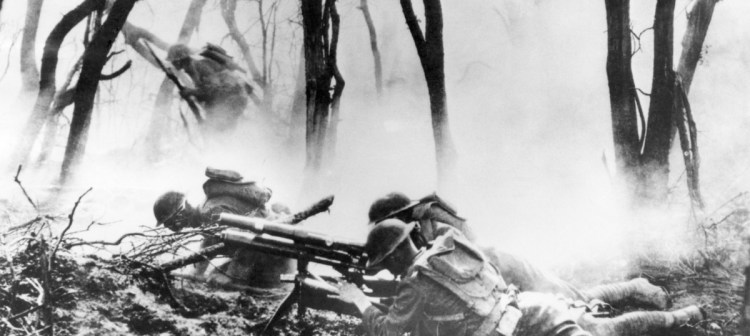One hundred years ago, on Sept. 26, 1918, in northeast France, the American Army began the offensive that would ultimately end World War I and send ripples across 20th-century history. The tip of the spear in Gen. John J. “Black Jack” Pershing’s attack that day was the 79th Division’s 313th Infantry Regiment, otherwise known as “Baltimore’s Own.” My paternal grandfather, Thomas Gilmor Ryan, was a member of that regiment.
I never met my grandfather. He died in 1950, eight years before I was born. I first learned of his participation in the greatest battle of the Great War while doing genealogical research. I found a copy of the Interment Control Form for his burial in the Baltimore National Cemetery. He enlisted on April 25, 1918, and was assigned to the HQ Company of the 313th. After only five months of training at Fort Meade he was thrust into the maw of “modern” mechanized warfare in the Meuse-Argonne.
In the early morning hours of the 26th, the 313th Infantry Regiment was assigned the task of taking the elevated German position at Montfaucon. The battle was joined in the pre-dawn hours by an intense Allied artillery bombardment. It is estimated that in the three hours before the troops began their attack, more shells were fired than had been used in the entire Civil War. What must young Thomas have thought? As the shells whistled over his head, did he think of his parents on Myrtle Avenue in Baltimore or long to be driving his ice wagon through the streets of his home town? I’ll never know for sure, but I do know what he surely didn’t: that the next several hours would expose him to barely imaginable horror.
The assault did not go well for the boys from Baltimore. They were the greenest of green, and the German troops, in addition to commanding a view of the entire battlefield from the top of Montfaucon, were seasoned by long exposure to battle. Communication in the Meuse-Argonne was spotty at best, and this, combined with the slow advance of the 313th, meant that artillery support soon outpaced the troops on the ground. Unchecked by Allied artillery, the entrenched German forces rained machine gun fire and poison gas on the regiment. An expected flanking maneuver from the troops on the right never materialized, and the advance of the 313th slowed to a crawl. Young men, who only months earlier had watched their comrades in arms take on the Baltimore Orioles in an exhibition baseball game, were now bogged down in a killing field. Somehow, Thomas Ryan survived.

The Meuse-Argonne cemetery in northeastern France is seen this month, nearly 100 years after the war ended on Nov. 11, 1918. The 1918 Meuse-Argonne offensive ended World War I.
Eventually, slowly, the 313th took Montfaucon. In the days and weeks that followed, the Allied forces advanced steadily, and on Nov. 11, 1918, the Great War would end. Henry Gunther, another boy from Baltimore, would be the last soldier killed in the war. By early June 1919, Thomas Ryan and the rest of the 313th returned to Baltimore and were feted with parades and banquets. On July 9 of that year, my grandfather was discharged from the Army.
Thomas attempted to live what one would call a normal life after his service. He married, had 10 children and returned to work driving wagons and later trucks.
He also drank. He drank a lot. He was abusive to his wife and children, so much so that his sons and daughters would rarely speak his name. The wounds were so deep that his youngest son, my father, was not able to forgive the abuse until he himself lay dying of cancer, some 40 years after Thomas’ death.
I have tried to learn more about my grandfather’s service, to perhaps understand the violence he inflicted on his family. His military records were lost in a fire in 1973, so I may never know more fully the role he played in that great battle a century ago. I may never know if the demons that chased him and haunted his family were purchased at Montfaucon. But I suspect that is so.
One hundred years later, it is worth remembering that the results of great battles ripple not only across the pages of history books, they also ripple across the lives of the soldiers who come home damaged from the duty we ask them to perform. It is also worth hoping that someday, we might stop asking them to perform it.
Copy the Story Link
Send questions/comments to the editors.



Success. Please wait for the page to reload. If the page does not reload within 5 seconds, please refresh the page.
Enter your email and password to access comments.
Hi, to comment on stories you must . This profile is in addition to your subscription and website login.
Already have a commenting profile? .
Invalid username/password.
Please check your email to confirm and complete your registration.
Only subscribers are eligible to post comments. Please subscribe or login first for digital access. Here’s why.
Use the form below to reset your password. When you've submitted your account email, we will send an email with a reset code.